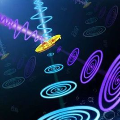Quantum Computing (QC) promises computational speedup over classic computing for solving complex problems. However, noise exists in current and near-term quantum computers. Quantum software testing (for gaining confidence in quantum software's correctness) is inevitably impacted by noise, to the extent that it is impossible to know if a test case failed due to noise or real faults. Existing testing techniques test quantum programs without considering noise, i.e., by executing tests on ideal quantum computer simulators. Consequently, they are not directly applicable to testing quantum software on real quantum computers or noisy simulators. To this end, we propose a noise-aware approach (named QOIN) to alleviate the noise effect on test results of quantum programs. QOIN employs machine learning techniques (e.g., transfer learning) to learn the noise effect of a quantum computer and filter it from a quantum program's outputs. Such filtered outputs are then used as the input to perform test case assessments (determining the passing or failing of a test case execution against a test oracle). We evaluated QOIN on IBM's 23 noise models, Google's two available noise models, and Rigetti's Quantum Virtual Machine (QVM), with nine real-world quantum programs and 1000 artificial quantum programs. Results show that QOIN can reduce the noise effect by more than $80\%$ on the majority of noise models. For quantum software testing, we used an existing test oracle and showed that QOIN attained scores of $99\%$, $75\%$, and $86\%$ for precision, recall, and F1-score, respectively, for the test oracle across six real-world programs. For artificial programs, QOIN achieved scores of $93\%$, $79\%$, and $86\%$ for precision, recall, and F1-score. This highlights QOIN's effectiveness in learning noise patterns for noise-aware quantum software testing.
翻译:暂无翻译


